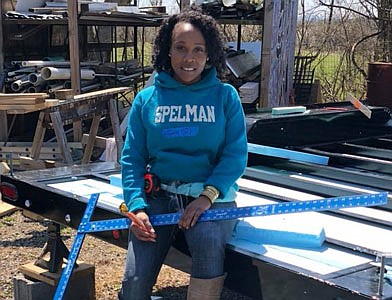Smalltimore Homes was more of a manifestation for founder LaQuida Chancey.
“I began researching and investing in the Baltimore Real Estate Market and … it wasn’t long before putting the first house on the market that the realization that most people who attended the open houses weren’t prepared to buy a home,” Chancey said. “At that moment, I knew my focus would probably need to shift. As a developer who focuses on affordability and first time home buyers, it didn’t seem to be enough to make an impact just focusing on those two things.”
Chancey, who regularly worked as volunteer for numerous organizations that focused on the homeless, noted she had a natural desire to end homelessness.
“And, I thought, ‘wow, I think tiny homes could end homelessness,” she said.
In February 2018, Chancey started Smalltimore Homes, an affordable housing and sustainable living solution, which focuses on enhancing community living and improving neighborhoods by creating alternative ownership opportunities.
The mission of the Smalltimore Homes is to provide those living below poverty level and those experiencing homelessness and families with individualized supportive services as well as tailored housing solutions with a goal of obtaining and maintaining affordable housing.
Chancey says she felt compelled to act when she noticed that many tent encampments around Baltimore were being cut off from public access and entire communities were being dismantled.
“It was quite sad to see… it really feels more like a war on homelessness and it’s not fair,” said Chancey, who attended Spelman College in Atlanta after growing up in Baltimore.
After researching a number of tiny home communities, Chancey says she figured there was more she could do.
“I think a Smalltimore Homes tiny home/micro shelter community could address Baltimore blight and vacancies by deconstructing/disassembling those properties first, dispose of anything hazardous or debris, then keep what is salvageable and safe, and start the community build with those salvageable materials,” she said. “It really could be a perfect model for transitional tiny home communities with the potential to grow into an entire eco-system that creates a stronger Baltimore.”
Chancey’s idea has caught on as many local organizations have found Smalltimore Homes online or on social media and want to collaborate and help advocate.
“We raised enough funds to construct at least 10 shelters already,” Chancey said. “Team Depot and The Home Depot Foundation gave us a grant to help build prototypes/models to be put on display throughout Baltimore for feedback and get the conversation started around homelessness and provide feedback for design enhancements.”
They’re now working on the logistics to have the models placed at different locations around Baltimore for 30 to 90 days at a time.
“The idea is that having the model there to see and touch, makes it easier to understand the concept and potentially it will trigger some thoughts and be a conversation piece,” Chancey said. “The stigma around homelessness is an issue too, and with time I’d like to address that with our youth specifically. I’ve been speaking with a few educators to brainstorm ways to somehow make this into an extra-curricular program to engage students in the discussion as well as the building process.”
Chancey says she plans to do this work “forever,” and certainly can always use assistance.
“At the moment, we meet monthly with volunteers to construct these simple micro-shelters which is more or less a shed on wheels and cost about $1,2000,” she said. “At the moment there’s no plumbing or electric but it would keep someone safe from the elements. Most anyone of any skill-set can assist.”
The next two build sessions are scheduled for Saturday, January 19 and Saturday, February 9 and will be held at the Baltimore Community Tool Bank from 10 a.m. to 2 p.m.
“Ideally, I would like to create a community of members who are vested and involved in homelessness advocacy and affordable housing initiatives to help create the best micro-shelter prototype and the best community,” Chancey said.
For more information about Smalltimore Homes or to find our how you may help, visit: www.smalltimorehomes.org.
